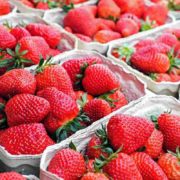Natural Solutions for Cleaning Your Produce
Whether you buy organic or not, taking some time to properly clean your produce is an important part of any wellness plan that shouldn’t be overlooked.
Eating a rainbow of colors is one of the best ways to ensure you’re getting the necessary vitamins and nutrients to nurture your immune system. But remember, you’re not the first person to handle that apple you’re about to take a bite out of! Because it travels through many hands and has passed through many environments, all produce is a host for bacteria, and unless you’re buying organic, pesticides too.
Take for example the E.coli outbreaks in the United States over the last several years. These outbreaks are caused by infected romaine lettuce and responsible for causing illnesses across multiple states. This may be an extreme, but it illustrates the point — just because you don’t see it, doesn’t mean it’s not there.
Additionally, tomatoes, cucumbers, apples, bell peppers, and many other fruits and vegetables are covered with wax to protect from spoilage and to maintain hydration. But given a choice, is it something you want to eat? Likely not…
The good news is that you DO have a choice! Bypassing a good wash leaves you susceptible to a wide range of bacteria and unwanted substances. Removing pesticides and de-waxing your fruits and vegetables is a fairly simple process and always recommended. It’s particularly important for berries and lettuces, even if they are organic, as they are a good host for powerful super bacteria.
We recommend the following two methods that use natural solutions to properly remove wax, pesticides, and harmful microbes before use (best to do this as soon as you unpack your groceries).
To de-wax & clean most fruits and vegetables:
Place the produce in a container filled with baking soda and water, approx. 1 tsp per 2 cups of water, covering them completely and letting it soak for at least 20 minutes. The baking soda will remove the wax on the outer skin and, more importantly, has been shown to be effective in removing pesticides. You can follow this up with a solution of ¼ cup of 3% hydrogen peroxide and water (again, just covering the produce) to remove bacteria. The hydrogen peroxide is a powerful anti-microbial that will help remove bacteria from the surface of the produce and also helps in removing pesticides.
For produce such as leafy greens and berries*:
Cover the produce in a solution of ½ cup of 3% hydrogen peroxide and water for 20 minutes & rinse with filtered or spring water.
*Berries typically spoil faster after washing, so this process is best done right before eating.
Although this may seem like a time-consuming process the benefits are far-reaching. Once the habit is created it will become second nature and you’ll feel great about being proactive in your health.
We are here for you, and we want to help.
Our goal is to return you to optimal health as soon as possible. To schedule an appointment please call: 703-532-4892 x2

